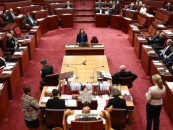Wrong way CCA, go back
November 12, 2014AGRIBUZZ WITH DAVID LEYONHJELM
THE Cattle Council of Australia is currently inviting comments on a verification system for sustainable beef which will comprise the basis for certification under the Global Roundtable for Sustainable Beef.
There are quite a number of industry roundtables, both in Australia and internationally. They are, in all but name, an extortion racket. Every one of them is a stalking horse for extreme green and anti-industry values. If the beef roundtable becomes widely established in Australia, it will bring nothing but harm and grief to beef production.
The creation of each roundtable follows a fairly similar course. It typically begins with some fairly extreme criticisms of industry practices, based on unrepresentative examples and misleading or manipulated information, frequently coming from one of the more radical groups such as Greenpeace.
The industry is accused of harming the planet, destroying the future of our children and being bad corporate citizens. There are threats of a campaign to expose it, focusing on its brand and image or those of its major customers. In the case of beef industry, attention was directed at McDonald’s, major processors and the supermarkets.
The industry is then approached by the World Wildlife Fund (WWF) which recommends a sustainability code of practice, describing it as industry best practice. It presents itself as eminently reasonable, even hiring someone from the industry as chief salesman, and gives assurances it will protect it from the nasty extremists. Get certified and all will be well, it says. Oh and by the way, there is a fee for certification.
Industry associations are usually among the first to sign up. Run by political operatives whose careers depend on dialogue and negotiation, the prospect of endless negotiations over codes and compromises amounts to a job for life.
Once in place, the code is progressively revised as new issues are introduced and standards raised. What about your use of nanotechnology? How about gender diversity and indigenous equity? Your unacceptable carbon footprint? Biodiversity? And by the way, sustainability means what we say, not you.
Major businesses that try to ignore the code of practice are publicly criticised and subject to direct action by the extremists. Governments are pressured to make the code mandatory and incorporate the certification scheme in legislation, with certification a condition of government procurement.
None of this is fictional. WWF is known to contribute funds to Greenpeace, while the head of research at Greenpeace has said the organisation “is willing to play the role of good cop or bad cop in partnership with organisations [to] drive organisations to partner with groups that seem more middle-of-the-road in orientation”.
There are roundtables for fisheries, forestry, sugar, cotton, soy, palm oil, aquaculture and biofuels, in addition to beef. At an international level, WWF is known to have “partnered” with more than 30 of the world’s largest consumer brands. The timber industry is already reeling from the impact of certification being incorporated into the Illegal Logging Prohibition Act.
Some in the affected industries will say the alternative, of relentless attack by extremists, is worse. But that ignores the fact that the extremists are already involved and it is their long-term aims that are driving the agenda.
Some say the sustainability code is simply commonsense and good for the environment, and indeed it may appear that way at the beginning. But the code will be changed over time and won’t be anywhere near as tolerable in a few years.
Some say consumers are demanding assurance that the food they eat is produced sustainably. That is utter drivel. It is what consumers do that counts, not what they tell market researchers. Price and value, not ill-defined notions of sustainability, are what matter.
Some say certification can deliver a price premium, but like the supposed premium for not using growth promotants or growing non-GM (genetically modified) canola, when it comes to the crunch there will either be no premium or only a handful of people will ever receive it.
Some will say certification cannot be avoided, with major customers like McDonald’s and the supermarkets blackmailed into demanding it (although probably no blackmail was required in the case of Coles). If you want to sell your produce, you have to go along with it.
But that is also not true, at least not yet, and will only become true if enough producers are persuaded to sign up. Until that point, it is merely noise and bluff.
My advice to the Cattle Council is, stop right now. You have had many warnings, one of them from me, about the risks of this. Australia’s beef industry has outstanding environmental credentials with well over a century of export success accompanied by long-term care of the land. It does not need to prove anything, and the last thing it needs is WWF’s notions of sustainability tying its hands.
Withdraw from the entire roundtable process. Sack the employees who are advocating involvement. Tell McDonald’s and the supermarkets that you are recommending to your members to refuse to supply them if they insist on certification. If you stand your ground, you will prevail.
If you continue to play along, you will have many years to regret it.








